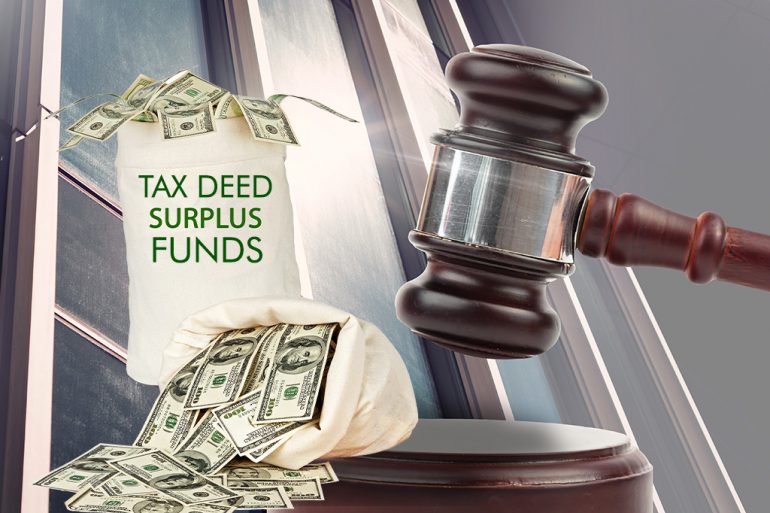Florida Tax Deed Sale Surplus Funds
You are the successful bidder at a tax deed auction! Congratulations! Now, what do you do about the liens of record? Is the surplus supposed to take care of every lien out there?
Remember in Florida and most other states that a tax deed is superior to certain kinds of liens and, even if these kinds of liens do not get satisfied from sales surplus, the lienholders cannot seek to enforce them against you or your subsequent buyers. These inferior liens include:
- Private mortgages (includes entities like Wells Fargo, Bank of America, JPMorgan Chase, and little loans from Aunt Alice or Uncle Jim)
- Certified copies of credit card judgments (I’m looking at you Capital One and Synchrony Bank)
- Association liens (condominium, community, or homeowners)
- Certain federal liens
If there are no surplus funds left to satisfy these junior liens and they have been properly noticed of the tax deed sale, you’re golden.
But What About Liens Superior to a Tax Deed?
These are liens that were given special standing by the Florida legislature: county and municipal liens. How are these liens treated when a tax deed sale takes place?
First, keep in mind that not every tax deed sale is going to have surplus funds. There will be many times when the winning bid is the starting bid. If your winning bid is above the starting bid, then there will be surplus funds.
Which parties have access to surplus funds is determined by the priority given to that party under Florida statutes. Surplus funds are treated the same way, regardless of whether the minimum bid price was for a homestead or non-homestead property.
Governmental liens of record are given first priority for disbursement. If there are multiple government liens, then the surplus is distributed pro-rata to each government lienholder. If the surplus funds are sufficient to cover all outstanding government liens, then they will all be paid in full.
If the surplus funds are sufficient to cover all outstanding government liens and there are still excess funds, then the clerk sends notice to the interested parties (the prior record owner and entities like private mortgages, credit card judgments, association liens, etc.) letting them know it is holding surplus funds for their benefit. The clerk generally pays out senior liens first (such as a purchase money mortgage), then junior liens (a second mortgage, a credit card judgment, an association lien, etc.).
Lienholders that the clerk must notice have 120 days to file a claim for surplus funds with the clerk. If they fail to submit a claim for available funds within the 120-day period, their claims will be barred. The only parties not time-barred regarding surplus funds are the prior property owners.
Woo! That was a lot of information to unpack! Don’t stress…I am going to review the above process for you using a couple of hypotheticals.
Tax Deed Sale Surplus Scenario 1
Tax Deed King LLC just won its first tax deed auction in Marion County. The starting bid amount was $10,000, and Tax Deed King LLC paid $80,000 as the winning bid. The property is a 3/2 residential property located in an older neighborhood. Based on the Ownership and Encumbrance Report, Tax Deed King LLC knows that, prior to the sale, the property was owned by Jennifer
White.
Liens on the property include:
- A purchase money mortgage held by Bank of America for $100,000
- A second mortgage held by Wells Fargo for $10,000
- A Chase credit card certified judgment for $5,000
- A city mowing lien, which has been accumulating daily penalties since it was entered two years ago, for $20,000
What happens to the surplus? First, let’s calculate how much is available for surplus funds: $80,000 (winning bid) – 10,000 (starting bid amount) = $70,000 in available surplus.
The city, a government entity, has priority and will get paid the $20,000 in full provided they file a claim for surplus funds for their mowing lien. If you know that there is a city lien, it is in your best interest to tell the city about the surplus funds as soon as possible so they are not time-barred by the 120-day rule. If they don’t take from the surplus within 120 days, you, the investor will be stuck owning the $20,000 to the city.
Once the city is paid, the next senior lienholder will have access to the remaining $50,000. Normally that would be Bank of America, but they failed to file a claim within the 120-day period. Wells Fargo, the holder on the second mortgage, did remember to file a claim for surplus funds within the time period. The clerk paid Wells Fargo the full $10,000.
The credit card lienholder Chase also failed to file a claim within the 120-day period. This leaves $40,000 for the prior owner of record. The credit union and the credit card company will not be able to seek payment of their liens against Tax Deed King LLC unless the clerk did not send them notice as required prior to the tax deed sale.
Tax Deed Sale Surplus Scenario 2
Tax Deed King LLC just won its first tax deed auction in Marion County. The starting bid amount was $10,000, and Tax Deed King LLC paid $25,000 as the winning bid.. Based on the Ownership and Encumbrance Report, Tax Deed King LLC knows that prior to the sale, the property was owned by Jennifer White.
Liens on the property include:
- A first mortgage held by Bank Of America for $100,000
- A second mortgage held by Wells Fargo for $10,000
- A Chase credit card certified judgment for $5,000
- A city mowing lien, which has been accumulating daily penalties since it was entered two years ago, for $20,000
What happens to the surplus this time? Again, let’s calculate how much is available for surplus funds: $25,000 (winning bid) – 10,000 (starting bid) = $15,000 in available surplus.
The city has priority and will get paid the $15,000 surplus provided they file a claim for surplus funds.
After the city is paid, they will still have a $5,000 balance on their lien. This balance is due and owing and is superior in interest to the tax deed. At this point, your best bet is to approach the city and see if they will issue a release of lien since the amount was substantially paid off by the surplus funds. Many cities will agree to release their lien if it has been substantially paid off through the surplus funds. If they refuse, then you may have to pay off the $5,000.
All other lienholders of record will have their liens wiped out due to the tax deed. They will not be able to seek payment of their liens against Tax Deed King LLC unless the clerk did not send them notice as required prior to the tax deed sale.
Know Who You’re Dealing With Before Bidding
In sum, a party of record gets priority to the surplus funds based on who they are and when they file a claim. Run a title search NOW and KNOW who can file before you bid. You absolutely need to have a plan in place when you win the auction to be sure you don’t end up owing money to parties that could have been paid from the surplus!








